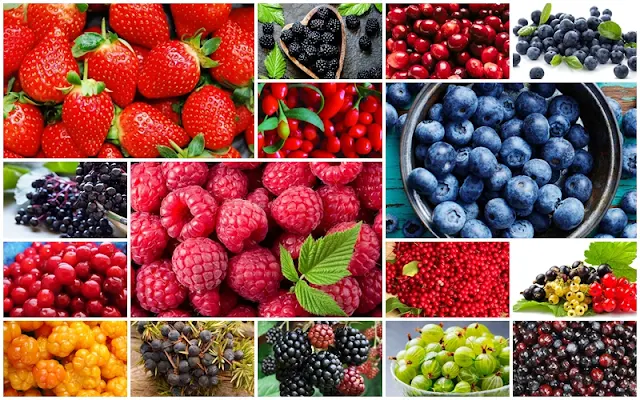Ideberries.com - Berries encompass a wide variety of fruit types, each with its own distinct characteristics, shapes, sizes, colors and flavors. They are known for their vibrant hues, juicy textures, and sweet or tart flavors.
Berries are not only delightful to eat but also pack a nutritional punch, making them a popular choice for health-conscious individuals.
One notable characteristic of berries is their high antioxidant content. Antioxidants help protect the body against oxidative stress and reduce the risk of chronic diseases.
Berries, such as blueberries, strawberries, and raspberries, are particularly rich in antioxidants like anthocyanins, which give them their vivid colors.
In addition to antioxidants, berries are a good source of vitamins and minerals. They often contain significant amounts of vitamin C, which supports immune function and collagen production.
Berries also provide dietary fiber, which aids in digestion and helps maintain a healthy weight by promoting feelings of fullness.
Another remarkable aspect of berries is their potential health benefits. Studies have suggested that consuming berries regularly may help improve brain function, protect against age-related cognitive decline, and lower the risk of certain chronic conditions, including heart disease and certain types of cancer.
Berries are incredibly versatile and can be enjoyed in numerous ways. They can be eaten fresh as a snack, incorporated into smoothies, used as toppings for yogurt or cereal, and added to baked goods or salads for added flavor and nutrition.
Whether you prefer the tangy taste of cranberries, the sweet juiciness of strawberries, or the antioxidant power of blueberries, incorporating a variety of berries into your diet can provide a range of nutritional benefits and add a burst of flavor to your meals and snacks.
Different Types of Berries: Nutritional Profiles and Unique Benefits
Here is a comprehensive list of various types of berries, along with a brief description of their nutritional profiles and unique benefits:
Strawberries
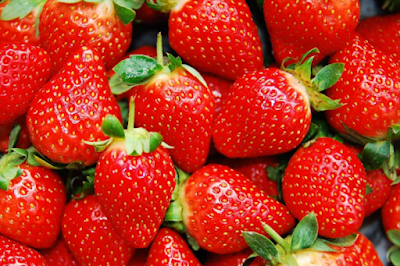 |
| Photo by Expressnews.com |
Strawberries are not only delicious but also packed with numerous nutritional benefits. These vibrant red fruits are an excellent source of vitamins, minerals, and antioxidants, making them a valuable addition to a healthy diet.
Firstly, strawberries are rich in vitamin C, which plays a vital role in immune function and collagen production.
Just one serving of strawberries can provide more than the recommended daily intake of vitamin C, helping to boost your body's defense against illnesses and promote skin health.
Secondly, strawberries are a great source of dietary fiber. Fiber is essential for maintaining a healthy digestive system and preventing constipation.
Consuming an adequate amount of fiber can also help control blood sugar levels and lower the risk of heart disease.
Including strawberries in your diet can contribute to your daily fiber intake and promote overall digestive health.
Lastly, strawberries are packed with antioxidants, such as anthocyanins and ellagic acid.
These antioxidants help protect the body against free radicals, which are unstable molecules that can cause cellular damage and contribute to chronic diseases like cancer and heart disease.
The powerful antioxidants in strawberries have been linked to a reduced risk of inflammation, improved blood vessel function, and better cognitive health.
Strawberry Nutritional Profiles
| Nutrient | Amount per 100g |
|---|---|
| Calories | 32 kcal |
| Carbohydrates | 7.7 g |
| Sugar | 4.9 g |
| Fiber | 2 g |
| Protein | 0.7 g |
| Fat | 0.3 g |
| Vitamin C | 58.8 mg |
| Vitamin A | 1 IU |
| Calcium | 16 mg |
| Potassium | 153 mg |
Blueberries
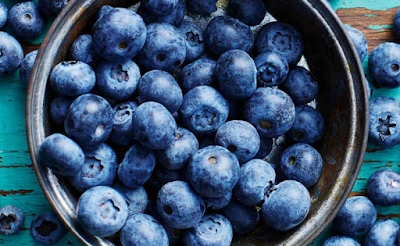 |
| Photo by Realsimple.com |
Blueberries are small, round berries that are not only delicious but also incredibly nutritious. They are packed with a wide range of vitamins, minerals, and antioxidants, making them a powerhouse of health benefits. Here is a general overview of the nutritional benefits of blueberries.
Firstly, blueberries are an excellent source of antioxidants. They are particularly rich in a group of antioxidants called anthocyanins, which give them their vibrant blue color.
These antioxidants help protect the body against oxidative stress and damage caused by harmful free radicals. Regular consumption of blueberries has been linked to a reduced risk of chronic diseases, including heart disease, certain cancers, and age-related cognitive decline.
Secondly, blueberries are low in calories but high in nutrients. They are a good source of dietary fiber, which aids in digestion and helps maintain a healthy weight.
Blueberries also contain essential vitamins and minerals like vitamin C, vitamin K, and manganese.
Vitamin C is important for immune function and collagen production, while vitamin K is crucial for blood clotting and bone health. Manganese plays a role in metabolism and antioxidant defense.
Additionally, blueberries are known for their potential benefits in promoting brain health.
Several studies have suggested that the antioxidants in blueberries can improve memory, cognitive function, and overall brain health.
They may also help reduce the risk of age-related cognitive decline and neurodegenerative diseases like Alzheimer's.
Blueberry Nutritional Profiles
| Nutrient | Amount per 100g |
|---|---|
| Calories | 57 kcal |
| Carbohydrates | 14.5 g |
| Sugar | 9.96 g |
| Fiber | 2.4 g |
| Protein | 0.7 g |
| Fat | 0.3 g |
| Vitamin C | 9.7 mg |
| Vitamin A | 54 IU |
| Calcium | 6 mg |
| Potassium | 77 mg |
Raspberries
 |
| Photo by Healthyfamilyproject.com |
Raspberries, those vibrant and delicious berries, offer numerous health benefits that make them a fantastic addition to your diet.
Packed with essential nutrients, raspberries are not only a tasty treat but also provide several advantages for your overall well-being.
Firstly, raspberries are an excellent source of dietary fiber. With approximately 8 grams of fiber per cup, they contribute to a healthy digestive system, aid in weight management, and promote a feeling of fullness, thus assisting in controlling appetite and preventing overeating.
Secondly, raspberries are rich in antioxidants. These tiny berries are bursting with compounds like anthocyanins, quercetin, and vitamin C, which help neutralize harmful free radicals in the body.
By doing so, raspberries protect against oxidative stress and inflammation, reducing the risk of chronic diseases such as heart disease, cancer, and neurodegenerative disorders.
Lastly, raspberries are a low-calorie fruit, making them a great choice for those watching their calorie intake.
They provide natural sweetness without packing on excessive calories, making them a healthier alternative to sugary snacks and desserts.
Furthermore, raspberries have a low glycemic index, meaning they have a minimal impact on blood sugar levels. This characteristic is particularly beneficial for individuals with diabetes or those looking to manage their blood sugar levels.
Raspberry Nutritional Profiles
| Nutrient | Amount per 100g |
|---|---|
| Calories | 53 kcal |
| Carbohydrates | 12.3 g |
| Sugar | 4.4 g |
| Fiber | 6.5 g |
| Protein | 1.2 g |
| Fat | 0.7 g |
| Vitamin C | 26.2 mg |
| Vitamin A | 33 IU |
| Calcium | 25 mg |
| Potassium | 151 mg |
Blackberries
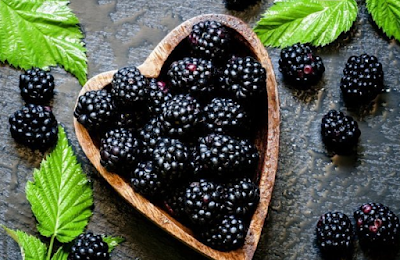 |
| Photo by East-fruit.com |
Blackberries, with their rich color and sweet-tart taste, are not only a delicious treat but also offer numerous health benefits. These berries are packed with essential nutrients that can contribute to your overall well-being.
Blackberries are an excellent source of dietary fiber. With approximately 8 grams of fiber per cup, they promote a healthy digestive system, aid in preventing constipation, and support regular bowel movements.
Consuming an adequate amount of fiber can also help maintain healthy cholesterol levels and reduce the risk of heart disease.
Secondly, blackberries are a powerhouse of antioxidants. They are loaded with anthocyanins, which give the berries their deep purple color and provide significant health benefits.
Antioxidants help protect the body from oxidative stress caused by free radicals, reducing inflammation and lowering the risk of chronic diseases such as cancer, heart disease, and age-related cognitive decline.
The high antioxidant content in blackberries also supports a healthy immune system, helping the body fight off infections and illnesses.
Lastly, blackberries are a great source of vitamins and minerals. They are particularly rich in vitamin C, providing more than 30% of the recommended daily intake in just one cup.
Vitamin C is essential for immune function, collagen production, and wound healing. Blackberries also contain other beneficial nutrients like vitamin K, vitamin E, manganese, and potassium, which contribute to various aspects of health, including bone strength, skin health, and electrolyte balance.
Blackberry Nutritional Profiles
| Nutrient | Amount per 100g |
|---|---|
| Calories | 43 kcal |
| Carbohydrates | 9.6 g |
| Sugar | 4.9 g |
| Fiber | 5.3 g |
| Protein | 1.4 g |
| Fat | 0.4 g |
| Vitamin C | 21 mg |
| Vitamin A | 214 IU |
| Calcium | 29 mg |
| Potassium | 162 mg |
Cranberries
 |
| Photo by Everydayhealth.com |
Cranberries are renowned for their tart taste and vibrant red color, and they also offer a host of health benefits. These berries are packed with nutrients that can positively impact your well-being.
Firstly, cranberries are well-known for their potential in supporting urinary tract health. They contain compounds called proanthocyanidins, which help prevent bacteria from adhering to the urinary tract walls, reducing the risk of urinary tract infections (UTIs).
Regular consumption of cranberries or cranberry juice has been associated with a decreased incidence of UTIs, particularly in women.
Secondly, cranberries are a rich source of antioxidants, particularly flavonoids and vitamin C. Antioxidants play a crucial role in protecting the body against oxidative stress caused by harmful free radicals.
By neutralizing these free radicals, cranberries help reduce inflammation and combat the risk of chronic diseases, including cardiovascular disease, certain cancers, and age-related cognitive decline.
Lastly, cranberries are a good source of dietary fiber, providing about 4 grams per cup. Fiber is essential for maintaining a healthy digestive system, promoting regular bowel movements, and preventing constipation.
Adequate fiber intake is also associated with improved heart health and weight management. Including cranberries or cranberry products in your diet can help increase your fiber intake and support overall digestive well-being.
Cranberry Nutritional Profiles
| Nutrient | Amount per 100g |
|---|---|
| Calories | 46 kcal |
| Carbohydrates | 12.2 g |
| Sugar | 4 g |
| Fiber | 4.6 g |
| Protein | 0.4 g |
| Fat | 0.1 g |
| Vitamin C | 13.3 mg |
| Vitamin A | 60 IU |
| Calcium | 8 mg |
| Potassium | 85 mg |
Goji berries (wolfberries)
 |
| Photo by Made-in-china.com |
Goji berries, also known as wolfberries, have gained popularity in recent years due to their impressive health benefits.
These small red berries have long been used in traditional Chinese medicine and are now recognized for their potential contributions to overall well-being.
Firstly, goji berries are rich in antioxidants. They contain a wide range of antioxidants, including zeaxanthin, polysaccharides, and vitamins C and A.
These antioxidants help protect the body against oxidative stress, which can damage cells and contribute to various diseases. Consuming goji berries can support healthy aging, boost the immune system, and reduce the risk of chronic conditions such as heart disease and certain cancers.
Secondly, goji berries are a great source of vitamins and minerals. They are particularly high in vitamin C, which is essential for immune function, collagen production, and wound healing.
Goji berries also contain significant amounts of vitamin A, which is crucial for vision, bone health, and cell growth.
In addition, goji berries provide minerals such as iron, zinc, and selenium, which are important for energy production, immune function, and maintaining healthy metabolism.
Lastly, goji berries have been associated with potential benefits for brain health and overall cognitive function.
Some studies suggest that the antioxidants and other bioactive compounds found in goji berries may protect against age-related cognitive decline, improve memory and focus, and promote overall brain health.
Goji Berry Nutritional Profiles
| Nutrient | Amount per 100g |
|---|---|
| Calories | 83 kcal |
| Carbohydrates | 17.4 g |
| Sugar | 13.3 g |
| Fiber | 4.8 g |
| Protein | 9 g |
| Fat | 0.4 g |
| Vitamin C | 48.4 mg |
| Vitamin A | 26822 IU |
| Calcium | 112 mg |
| Potassium | 911 mg |
Acai berries
 |
| Photo by Tropicalacai.com |
Acai berries are small, dark purple berries native to the Amazon rainforest in South America. They are rich in antioxidants, particularly anthocyanins, which can help protect cells from damage caused by harmful free radicals.
Acai berries are also a good source of fiber, healthy fats, and vitamins A and C. They have gained popularity for their potential to support heart health, improve digestion, boost immune function, and provide an energy boost.
Acai Berry Nutritional Profiles
| Nutrient | Amount per 100g |
|---|---|
| Calories | 70 kcal |
| Carbohydrates | 4 g |
| Sugar | 2 g |
| Fiber | 2 g |
| Protein | 1 g |
| Fat | 5 g |
| Vitamin C | 4.2 mg |
| Vitamin A | 15 IU |
| Calcium | 24 mg |
| Potassium | 200 mg |
Elderberries
 |
| Photo by Gardenerspath.com |
Elderberries are small, dark purple berries that grow on the elder tree. They have a tart flavor and are commonly used in jams, syrups, and herbal remedies. Elderberries are packed with antioxidants, including anthocyanins and flavonols, which can help support the immune system and fight inflammation.
They are often used to relieve cold and flu symptoms, as they may have antiviral properties. Elderberries are also a good source of vitamins A and C and contain dietary fiber.
Elderberry Nutritional Profiles
| Nutrient | Amount per 100g |
|---|---|
| Calories | 73 kcal |
| Carbohydrates | 18.4 g |
| Sugar | 11 g |
| Fiber | 7 g |
| Protein | 0.7 g |
| Fat | 0.5 g |
| Vitamin C | 36 mg |
| Vitamin A | 333 IU |
| Calcium | 38 mg |
| Potassium | 280 mg |
Lingonberries
 |
| Photo by Semiswede.com |
Lingonberries are small, red berries that are native to the northern regions of Europe, Asia, and North America. They have a slightly tart taste and are commonly used in jams, sauces, and baked goods.
Lingonberries are rich in antioxidants, particularly polyphenols, which can help protect against oxidative stress and inflammation. They are also a good source of vitamins C and E, as well as dietary fiber. Lingonberries are known for their potential to support urinary tract health, improve cardiovascular health, and enhance cognitive function.
Lingonberry Nutritional Profiles
| Nutrient | Amount per 100g |
|---|---|
| Calories | 43 kcal |
| Carbohydrates | 9.6 g |
| Sugar | 7.2 g |
| Fiber | 4 g |
| Protein | 0.7 g |
| Fat | 0.4 g |
| Vitamin C | 10 mg |
| Vitamin A | 13 IU |
| Calcium | 8 mg |
| Potassium | 79 mg |
Mulberries
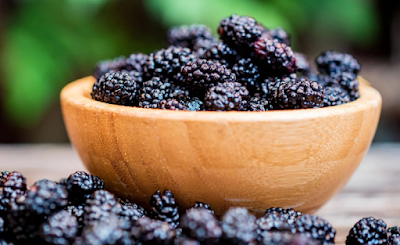 |
| Photo by Demfarm.id |
Mulberries are small, sweet berries that come in various colors, including black, red, and white. They are native to Asia but are now grown in many parts of the world.
Mulberries are rich in antioxidants, such as anthocyanins and resveratrol, which have been associated with numerous health benefits. They are also a good source of vitamins C and K, iron, and dietary fiber.
Mulberries have been linked to improved blood sugar control, reduced inflammation, enhanced digestion, and improved cardiovascular health.
Mulberry Nutritional Profiles
| Nutrient | Amount per 100g |
|---|---|
| Calories | 43 kcal |
| Carbohydrates | 9.8 g |
| Sugar | 8.1 g |
| Fiber | 1.7 g |
| Protein | 1.4 g |
| Fat | 0.4 g |
| Vitamin C | 36.4 mg |
| Vitamin A | 124 IU |
| Calcium | 39 mg |
| Potassium | 194 mg |
Boysenberries
 |
| Photo by Allrecipes.com |
Boysenberries are large, juicy berries that are a cross between raspberries, blackberries, and loganberries. They have a sweet and tangy flavor and are commonly used in jams, pies, and desserts. Boysenberries are rich in antioxidants, particularly anthocyanins, which can help fight oxidative stress and inflammation.
They are also a good source of vitamins C and K, as well as dietary fiber. Boysenberries are known for their potential to support digestive health, improve immune function, and promote healthy skin.
Boysenberry Nutritional Profiles
| Nutrient | Amount per 100g |
|---|---|
| Calories | 62 kcal |
| Carbohydrates | 14.7 g |
| Sugar | 9.6 g |
| Fiber | 5.3 g |
| Protein | 1.4 g |
| Fat | 0.5 g |
| Vitamin C | 21.9 mg |
| Vitamin A | 166 IU |
| Calcium | 36 mg |
| Potassium | 162 mg |
Huckleberries
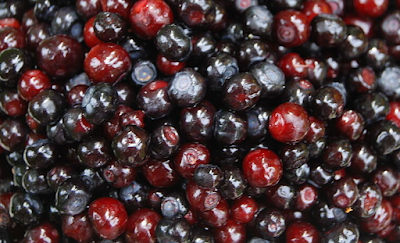 |
| Photo by Cascadeorganic.com |
Huckleberries are small, round berries that resemble blueberries. They come in various colors, including blue, red, and black. Huckleberries are rich in antioxidants, particularly anthocyanins, which contribute to their potential health benefits.
They are a good source of vitamins C and E, fiber, and manganese. Huckleberries are known for their potential to support heart health, boost the immune system, improve cognitive function, and promote healthy digestion.
Huckleberry Nutritional Profiles
| Nutrient | Amount per 100g |
|---|---|
| Calories | 60 kcal |
| Carbohydrates | 14 g |
| Sugar | 4 g |
| Fiber | 4 g |
| Protein | 1 g |
| Fat | 0 g |
| Vitamin C | 9.5 mg |
| Vitamin A | 30 IU |
| Calcium | 8 mg |
| Potassium | 79 mg |
Gooseberries
 |
| Photo by Bbcgoodfood.com |
Gooseberries are small, tart berries that come in various colors, such as green, red, and yellow. They have a slightly sweet and tangy taste. Gooseberries are packed with antioxidants, particularly vitamin C, which supports immune function and helps protect against cellular damage.
They are a good source of fiber, vitamins A and E, and manganese. Gooseberries are known for their potential to improve eye health, support digestion, boost collagen production, and promote healthy skin.
Gooseberry Nutritional Profiles
| Nutrient | Amount per 100g |
|---|---|
| Calories | 44 kcal |
| Carbohydrates | 10.2 g |
| Sugar | 4.5 g |
| Fiber | 4.3 g |
| Protein | 0.9 g |
| Fat | 0.6 g |
| Vitamin C | 27.7 mg |
| Vitamin A | 290 IU |
| Calcium | 25 mg |
| Potassium | 198 mg |
Marionberries
 |
| Photo by Seriouseats.com |
Marionberries are a type of blackberry cultivar known for their sweet, juicy flavor. They are a cross between blackberries and raspberries. Marionberries are rich in antioxidants, including anthocyanins, which contribute to their potential health benefits.
They are a good source of vitamins C and K, fiber, and manganese. Marionberries are known for their potential to support heart health, improve brain function, aid in digestion, and provide anti-inflammatory benefits.
Marionberry Nutritional Profiles
| Nutrient | Amount per 100g |
|---|---|
| Calories | 82 kcal |
| Carbohydrates | 20 g |
| Sugar | 11 g |
| Fiber | 5.3 g |
| Protein | 1.4 g |
| Fat | 0.7 g |
| Vitamin C | 9.6 mg |
| Vitamin A | 29 IU |
| Calcium | 40 mg |
| Potassium | 175 mg |
Loganberries
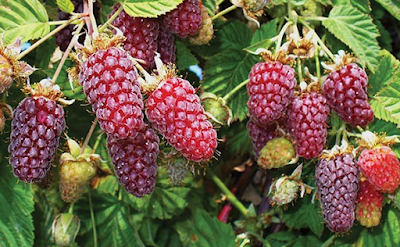 |
| Photo by Degroot-inc.com |
Loganberries are hybrid berries that are a cross between blackberries and raspberries. They have a dark red to purple color and a tart, sweet taste. Loganberries are rich in antioxidants, particularly anthocyanins, which have been associated with numerous health benefits.
They are a good source of fiber, vitamins C and K, and manganese. Loganberries are known for their potential to support cardiovascular health, improve cognitive function, aid in digestion, and promote healthy skin.
Loganberry Nutritional Profiles
| Nutrient | Amount per 100g |
|---|---|
| Calories | 33 kcal |
| Carbohydrates | 7.4 g |
| Sugar | 4.3 g |
| Fiber | 2.2 g |
| Protein | 1.3 g |
| Fat | 0.4 g |
| Vitamin C | 14.1 mg |
| Vitamin A | 180 IU |
| Calcium | 29 mg |
| Potassium | 141 mg |
Dewberries
 |
| Photo by Texasrealfood.com |
Dewberries are similar to blackberries and are part of the same genus, but they have a distinct flavor. They are smaller and more delicate in comparison. Dewberries are rich in antioxidants, particularly anthocyanins, which contribute to their potential health benefits.
They are a good source of vitamins C and K, fiber, and manganese. Dewberries are known for their potential to support digestive health, boost the immune system, improve brain function, and promote healthy skin.
Dewberry Nutritional Profiles
| Nutrient | Amount per 100g |
|---|---|
| Calories | 32 kcal |
| Carbohydrates | 7.6 g |
| Sugar | 4.9 g |
| Fiber | 2.8 g |
| Protein | 0.7 g |
| Fat | 0.4 g |
| Vitamin C | 21.0 mg |
| Vitamin A | 146 IU |
| Calcium | 29 mg |
| Potassium | 212 mg |
Currants (red, black, and white)
.png) |
| Photo by Peakpx.com |
Currants are small berries that come in different colors, including red, black, and white. They are known for their tangy and slightly sweet flavor profiles. Currants are packed with nutritional benefits, making them a valuable addition to a healthy diet.
Red currants are vibrant red berries that offer a tart and refreshing taste.
They are known for their potential to support heart health, improve blood circulation, and promote healthy skin.
Red currants can be enjoyed in various ways, such as in jams, jellies, desserts, or as a topping for salads and yogurt.
Black currants are small, dark purple berries that have a tart and slightly sweet flavor.
They are known for their potential to support eye health, boost immune function, improve brain function, and promote healthy skin. Black currants can be used in a variety of culinary creations, including juices, sauces, baked goods, and smoothies.
White currants are translucent or pale yellow berries that have a mild and slightly sweet taste.
They are known for their potential to support immune function, promote healthy skin, and aid in digestion.
Currant Nutritional Profiles
| Nutrient | Red Currants (per 100g) | Black Currants (per 100g) | White Currants (per 100g) |
|---|---|---|---|
| Calories | 56 kcal | 63 kcal | 56 kcal |
| Carbohydrates | 13.8 g | 15.4 g | 12.7 g |
| Sugar | 7.4 g | 7.4 g | 7.4 g |
| Fiber | 4.3 g | 7.7 g | 4.2 g |
| Protein | 1.4 g | 1.4 g | 1.4 g |
| Fat | 0.2 g | 0.4 g | 0.2 g |
| Vitamin C | 41.0 mg | 181.0 mg | 41.0 mg |
| Vitamin A | 230 IU | 290 IU | 230 IU |
| Calcium | 33 mg | 55 mg | 33 mg |
| Potassium | 275 mg | 322 mg | 275 mg |
Cloudberries
 |
| Photo by Voguescandinavia.com |
Cloudberries are unique berries that grow in cold regions, particularly in the Northern Hemisphere. They have a golden or amber color and a tart, sweet taste. Cloudberries are rich in antioxidants, particularly vitamin C, which supports immune function and helps protect against cellular damage.
They are a good source of fiber, vitamins A and E, and minerals like calcium and magnesium. Cloudberries are known for their potential to support eye health, improve digestion, boost collagen production, and provide anti-inflammatory benefits.
Cloudberry Nutritional Profiles
| Nutrient | Amount per 100g |
|---|---|
| Calories | 56 kcal |
| Carbohydrates | 15 g |
| Sugar | 9 g |
| Fiber | 4 g |
| Protein | 1 g |
| Fat | 0.4 g |
| Vitamin C | 27 mg |
| Vitamin A | 380 IU |
| Calcium | 25 mg |
| Potassium | 260 mg |
Junipers berries
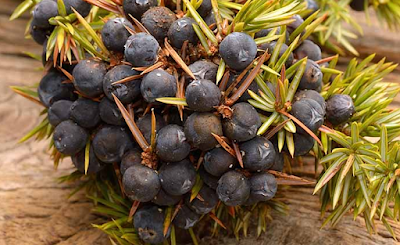 |
| Photo by Gardenerspath.com |
Please note that juniper berries are not typically consumed for their nutritional value, but for their flavor and use as a spice in various culinary applications. They are known for their distinct aroma and are commonly used in gin production.
As such, there is limited available information regarding the exact nutritional composition of juniper berries. However, I can provide you with some general information:
Juniperberry Nutritional Profiles
| Nutrient | Amount per 100g |
|---|---|
| Calories | 258 kcal |
| Carbohydrates | 34.1 g |
| Fat | 3.9 g |
| Protein | 10.6 g |
| Fiber | 53.5 g |
| Vitamin C | 30 mg |
| Vitamin E | 2.4 mg |
| Potassium | 525 mg |
| Iron | 5.1 mg |
| Magnesium | 107 mg |
Schisandra berries
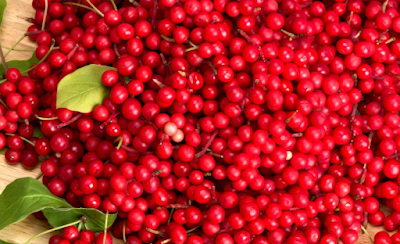 |
| Photo by Etsy.com |
Schisandra, also known as Schisandra chinensis, is a small red berry that is native to East Asia, including China and Russia. It is highly valued in traditional Chinese medicine for its various health benefits.
Schisandra berries are known as an "adaptogen," which means they are believed to help the body cope with stress and promote overall well-being.
They have a long history of use in Chinese medicine for enhancing vitality, promoting liver health, and improving mental function.
In addition to its traditional uses, Schisandra berries are also rich in antioxidants, including lignans, vitamins, and minerals. They have a unique taste, often described as a combination of sweet, sour, salty, bitter, and pungent flavors, which is why they are sometimes referred to as the "five-flavor berry."
It's important to note that while Schisandra berries have been used for centuries in traditional medicine, scientific research is ongoing to fully understand their potential health benefits.
If you're considering incorporating Schisandra berries into your wellness routine, it's recommended to consult with a healthcare professional or a qualified herbalist to ensure it aligns with your individual health needs.
These berries are all nutritious and offer various health benefits. However, it's important to note that individual responses may vary, and it's always best to incorporate a variety of fruits and vegetables into your diet for overall health and well-being.

